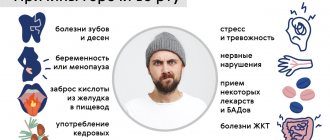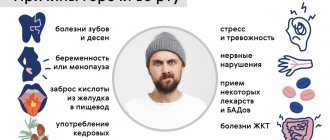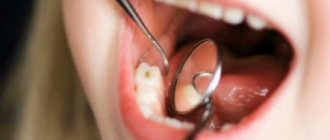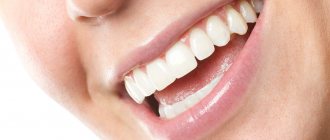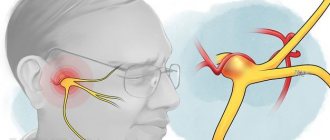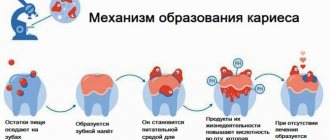Many people feel the taste of bitterness in the mouth, especially in older age, when various chronic diseases are acquired. The main causes of bitterness in the mouth after eating include diseases of the gastrointestinal tract, oral cavity, liver and gall bladder.
In rare cases, a bitter taste is a side effect of various medications or eating any foods, for example, fatty, fried, processed foods. These sensations are temporary and disappear after their cause is eliminated. The constant bitter taste sensation must be taken seriously.
Causes
Bitterness in the mouth after eating is a rather unpleasant symptom.
Depending on the circumstances and with what frequency bitterness in the mouth occurs, the etiology of this symptom can be assumed:
- Every morning you feel bitterness - this is a symptom of liver failure or gallbladder disease.
- After physical activity - liver disease.
- After eating - diseases of the stomach, intestines and gall bladder.
- When eating fatty or fried foods, diseases of the gallbladder, liver and bile ducts occur.
- Constant causeless bitterness is a symptom of cholecystitis, cholelithiasis, endocrine or psychological disorders, as well as cancer of the stomach, esophagus or intestines.
- Rare and quickly passing sensations of bitterness are the consequences of taking medications or stress.
It's all about the bile
How does bitterness in the mouth occur after eating? Thanks to the functioning of the liver, fats are broken down into food components that are easily digested. In this case, bile is released into the duct and emulsifies fats into particles. In cases of pathological processes, bile stagnates in the canal and is released into the esophagus. Bile also accumulates in the gallbladder. Due to this, a bitter taste appears in the mouth.
The cause of bile stagnation can be various diseases of the gastrointestinal tract, including inflammatory and infectious ones. In this case, bile enters the gastrointestinal canal in an amount that is not enough for the complete processing of all food.
Also, in this case, intestinal motility disorders occur, and as a result, stagnation of the digestive process. Undigested food is retained in the intestines, and rotting processes begin - this causes changes in taste sensations and the appearance of a bitter taste. A bitter taste in the mouth after eating food can be a symptom of the following diseases:
- Cholecystitis
- Jaundice
- Pancreatitis
- Colitis
- Gastroesophageal reflux disease
- Dyskenesia
Cholecystitis
Cholecystitis is an inflammation of the gallbladder. This disease is accompanied by bitterness in the mouth, heartburn, pain in the right side, and dry mouth. During the acute form of the disease, the temperature rises and vomiting, stool disturbances and the formation of a white coating on the tongue are possible.
Gastroesophageal reflux disease
Bitterness in the mouth after eating as an alarm signal
During this disease, there is an active release of gastric juice into the esophagus, sometimes so intensely that it reaches the esophagus and mouth. Therefore, it is not surprising to feel bitterness after eating. Such emissions usually occur due to overeating, abuse of fatty and fried or spicy foods.
Bad taste in the mouth
(bitter, sour, metallic)
An aftertaste in the mouth may linger for some time after eating very sour, spicy or overcooked foods. But if unpleasant sensations bother you with frequent frequency and are not associated with dietary habits, there is a reason to consult a gastroenterologist - perhaps this is the way the digestive tract signals its problems.
Causes of taste disturbance
Different tastes may indicate different disorders. Bitterness in the mouth is usually caused by:
- Pathologies of the liver, biliary tract (stones, cholecystitis, dyskinesia). In these diseases, the movement of bile through the ducts is disrupted. Bile stagnates, then is thrown into the stomach and further into the esophagus, from where it enters the oral cavity.
- Lazy bowel syndrome. Accompanied by a slowdown in the process of digesting food. Food is retained in the gastrointestinal tract, and with it digestive juices, including bile.
A sour taste often indicates problems with the stomach:
- ulcer,
- hyperacid gastritis,
- reflux esophagitis.
These diseases are characterized by increased formation of hydrochloric acid, which can rise up the digestive tract, reaching the oral cavity. Patients experience especially severe discomfort when lying down.
A metallic taste may be a sign of:
- Xerostomia (insufficient salivation). Accompanied by a pronounced feeling of dry mouth, burning sensation on the tongue and difficulty swallowing.
- Hemorrhagic gastritis. Small ulcers form in the stomach, from which blood periodically oozes. It is this that creates a specific taste in the mouth.
- Foreign body in the stomach. The condition can also be complicated by bleeding.
- Galvanose. This problem sometimes occurs in people with metal dentures in their mouths.
Diagnosis and treatment
At the appointment, the gastroenterologist asks the patient about complaints, clarifies the presence of accompanying symptoms and conducts a general examination. To confirm the diagnosis you may need:
- general and biochemical blood tests,
- Ultrasound of the abdominal cavity,
- gastroscopy,
- pH-metry,
- analysis for Helicobacter pylori.
Therapy is selected based on the results of the examination. Patients with signs of bleeding are subject to mandatory hospitalization.
You can get a consultation with a gastroenterologist and undergo the necessary tests at the Spectra clinic. We have experienced specialists who will help determine the exact cause of the disorders and select effective treatment. Reception is by appointment only.
Other reasons
A bitter taste in the mouth can also be felt for reasons not related to diseases of the gastrointestinal tract. These reasons include:
- Hormonal disorders
- Gingivitis
- Periodontitis
- Diabetes
- Taste disorders
- Oral diseases
Inflammatory diseases of the oral cavity, untreated caries and pulpitis, periodontitis and gingivitis can often be accompanied by bitterness after eating. This is due to the processes of decay in the mouth, inside the tooth or gum. During inflammation, many pathogenic microorganisms appear in the oral cavity; as a result of their reproduction and the spread of their waste products, bad breath and bitterness appear.
Taste disorders
With this disease, disruptions in the functioning of taste buds located in the palate and tongue occur. Many people suffering from this disease feel bitterness all the time. Elderly people, whose number of taste buds are significantly reduced, are susceptible to this disease.
Hormonal disorders
Diseases of the endocrine system are accompanied by hormonal disorders. If they are associated with a malfunction of the thyroid gland, an increased amount of secretion is released. As a result, adrenaline is released. This hormone can provoke muscle spasms of the biliary tract, after which dyskinesia occurs and, as a result, bitterness in the mouth.
Pregnancy
During pregnancy, heartburn and a bitter taste in the mouth occur quite often. The reason for this is the increased growth of the uterus and its pressure on neighboring organs, including the stomach and gall bladder.
Side effect after taking medication
Many antibiotics, antihistamines and antifungals increase the load on the liver. Therefore, after taking them, quite often a feeling of bitterness and other unpleasant symptoms occur in the mouth. Even many phytomedicines, for example, St. John's wort and boron uterus, have an effect on the functioning of the liver. After stopping taking these medications, the unpleasant symptom disappears without a trace.
Top 5 Causes of Bad Breath
Frequent communications with other people are an integral part of modern life. While bad breath can cause “forced silence.” How to avoid becoming an introvert against your will? And where to look for the cause of the trouble?
1. Insufficient hygiene and dental diseases
Food debris on teeth and gums provides food for oral bacteria. And the “waste” of such a diet becomes volatile compounds (ammonia, hydrogen sulfide and others), a large concentration of which is felt as an unpleasant odor.
In addition, such conditions contribute to the proliferation of pathogenic flora, which:
- firstly, it disrupts the pH of the oral cavity (due to bacterial waste products) and promotes demineralization of enamel and tooth tissue itself;
- and secondly, it increases the concentration of volatile substances in the oral cavity and contributes to the appearance of an unpleasant odor.
Thus, both improper hygiene and excess bacteria and signs of inflammation in gum disease, even with good hygiene, may be to blame for the appearance of a “problematic” odor.
In the first case, normal hygiene procedures twice a day, as well as rinsing after meals during the day, are sufficient to eliminate the problem. And in the second, the solution obviously requires the participation of a dentist.
Dry oral mucosa
This phenomenon often occurs while taking certain medications and is caused by insufficient saliva production.
In this case, the cleansing properties of saliva practically disappear, which contributes to the “accumulation” of food debris in the oral cavity and their “decomposition”, and also significantly “makes life easier” for bacteria.
Chronic diseases of the respiratory system
Chronic tonsillitis, pharyngitis, and sinusitis are a reliable source of excessive growth of bacteria in the oral cavity. Here we are most often talking about staphylococci and streptococci, which have pronounced pathogenic properties.
An unpleasant odor can also appear with purulent diseases of the bronchi and lungs, as well as with tumors at the stage of destruction. In this case, the smell from the mouth often becomes putrid in nature, and the cough is accompanied by copious sputum production.
Digestive system diseases
“Stomach” odors are often sour (with normal and high acidity) or “rotten” in nature (with low acidity), and appear under the following conditions:
- reflux of stomach contents back into the esophagus (reflux),
- narrowing of the gastric outlet (pyloric stenosis),
- the presence of ulcerative and oncological processes in the stomach or duodenum.
The smell can also be associated with liver damage, and then it has a characteristic “liver” tint.
Severe metabolic disorders
We are talking primarily about diabetes mellitus and its severe complication – ketoacidosis. The smell from the mouth in which case resembles “acetone”, and the condition itself can be fatal.
How to find the reason
1. You can confirm the “microbial” origin of bad breath by inoculating a swab from the throat and nose. The study will not only “show” the quantity and quality of microorganisms, but will also allow you to select an effective antibacterial drug, if necessary.
Culture is also relevant for sputum, if it is separated.
And also, in any case, an examination by a dentist and an ENT doctor is recommended.
2. It is quite difficult to check the condition of the stomach and duodenum using laboratory methods, therefore, if a “gastric” origin of the odor is suspected, a consultation with a gastroenterologist and FGDS is recommended.
3. The liver is one of the most multifunctional organs, so it is not surprising that many people experience its damage at a young age.
You can check the digestive function of the organ using a blood test for liver enzymes (ALT, AST), bilirubin, alkaline phosphatase and gamma-GT, both individually and in the format of the Liver Examination complex. Base".
4. A blood test for glucose levels and glycated hemoglobin (average level over the last 3 months) is “meant” to control the risk of diabetes.
What to do?
Bitterness in the mouth after eating can be eliminated in various ways.
So, there are quite a few causes of bitterness in the mouth and it is impossible to determine the exact etiology from just one or a few symptoms. In order to get rid of this unpleasant feeling, you need to undergo a full examination, including:
- Ultrasound
- Gastroscopy
- Colonoscopy
- Laboratory diagnostics
- Computed tomography
- MRI
Choosing the right research and treatment is impossible without consulting a gastroenterologist, therapist, or neurologist.
How to reduce bitterness in your mouth
You can get rid of the feeling of bitterness in your mouth only after treating the disease of which it is a symptom. To alleviate the condition, you need to reconsider your diet: do not eat fried, fatty, salty and smoked foods, switch to foods of plant origin. You should avoid stress, take soothing herbal infusions, and exercise.
A feeling of bitterness may occur due to the formation of toxins in the body. Therefore, it is necessary to treat the intestines. Cleansing enemas and taking enterosorbents will help, which not only cleanse the body of toxins, but also relieve constipation and ensure regular bowel movements. To cleanse the body, you need to drink plenty of clean water every day.
Folk remedies
Bitterness in the mouth may be due to medication
In cases where no serious pathologies are found, folk recipes will help get rid of the feeling of bitterness in the mouth.
- Flax seed. To prepare the drink, take a quarter cup of ground flaxseed, add half a liter of boiled water and leave. Drink half a glass in the morning.
- Vegetable juices. Freshly squeezed juices from potatoes, carrots and celery increase the secretion of saliva and thereby help with bitterness in the mouth.
- Decoction of calendula flowers. For half a liter of boiling water you need to take 20 grams of calendula flowers, bring to a boil and leave. It is recommended to take 2 glasses per day for a month.
- Sunflower oil. Keep the slightly heated oil in your mouth for several minutes. The feeling of bitterness should disappear.
- Corn silk. A decoction of corn silk has choleretic properties, it contains fiber, B vitamins, and vitamin E. It helps cleanse the body, get rid of bad breath and stimulate the production of digestive enzymes.
- Rose hip decoction. Rosehip decoction is a choleretic agent and a real vitamin bomb. This drink not only relieves the feeling of bitterness in the mouth after eating, it also stimulates the immune system.
The choice of treatment for bitterness in the mouth depends on the disease that caused this sensation. No matter how harmless this symptom may seem, the cause of its occurrence can be quite serious, so you should not neglect this signal from the body and listen to it: get examined and begin treatment.
Treatment and elimination of symptoms
A set of therapeutic measures is selected depending on the pathology after diagnostic procedures .
It is worth noting! The goal of treatment is not only to eliminate the symptom itself. First of all, it is important to get rid of the pathology that caused the taste of eggs in the mouth.
Medications
As for medications , the following drugs are used depending on the disease:
- for dysbiosis, medications from the class of probiotics are used , for example, such as Hilak Forte and Linex;
- in situations with constipation, laxatives are used (they must be prescribed by a doctor), as well as enemas with olive or vaseline oil ;
- if the cause of bad breath is a lack of digestive enzymes Mezim Forte and Festal are taken ;
- the process of producing bile in the body , then Allochol or Holosas ;
- for stomach ulcers or gastritis, Almagel and analogues are used ;
- if there is a bacterial infection , then you will need to take a course of Amoxicillin and Phthalazol ;
- if there are parasites use Levamisole, Metronidazole and other similar drugs.
Important! Under no circumstances should you self-medicate if you have a smell of rotten eggs coming from your mouth. Medicines are prescribed only by a doctor after proper diagnosis.
Diet
It happens that the taste of rotten eggs in the mouth appears due to food poisoning. In such a situation, to get rid of the symptom you will need to do a gastric lavage.
In order to provoke a gag reflex, you can prepare a weak solution of soda and drink it in small sips.
After gastric lavage, you need to take any sorbent.
As for directly eliminating the symptom , you can get rid of it yourself at home.
First of all , you should pay attention to the daily menu and adjust your diet. Low acidity is eliminated by consuming :
- fermented milk products;
- meat;
- fish;
- vegetables You can make a beet or turnip salad.
Keep in mind! To eliminate the symptom, you need to exclude the following foods from your diet:
- alcoholic products;
- citrus;
- plums, cherries;
- legumes;
- milk products;
- cabbage, squash, zucchini;
- bread.
When the smell of rotten eggs appears in the mouth, eat food 5 times a day in small portions. strictly not recommended to fast for “accumulation of acid”, as well as to overeat.
Folk recipes
You should know! At home, you can use the following methods to get rid of the smell of rotten eggs from your mouth:
- herbal decoctions (melissa, chamomile, yarrow). Infusions of raspberry leaves, rosehip or sea buckthorn, as well as St. John's wort and lingonberry, give a good effect. These herbs can be purchased at the pharmacy and prepared according to the attached instructions, or 1/2 teaspoon of herbal raw materials, pour 300 ml of boiling water and leave for 15 minutes;
- take general strengthening agents, for example, vitamin-mineral complexes . It is useful in such a situation to drink mineral water;
- soda solution. To quickly get rid of an uncomfortable symptom, you will need to prepare a weak soda solution. Dilute 1/2 teaspoon of the substance in 250 ml of water and drink in small quantities when hydrogen sulfide belching occurs;
- eggshell. For this remedy, you will need to boil the eggs for 20 minutes, peel them, remove the film from the shell and grind the shell into powder. Take 1/2 teaspoon three times a day. The product should be washed down with clean water;
- mint tincture. The product can be purchased at a pharmacy and taken 15-20 drops with meals.



